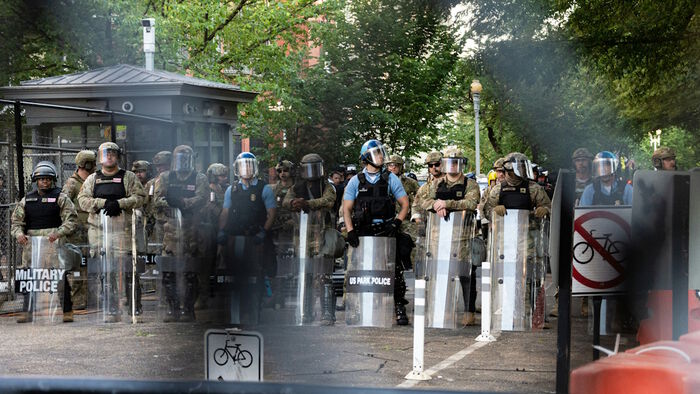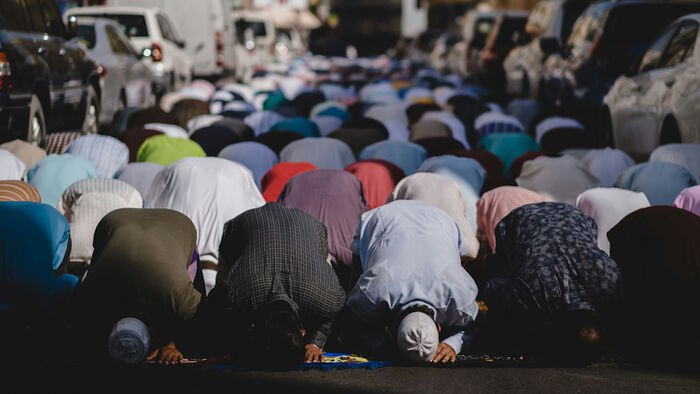There is a serious threat of violence during the 2024 U.S. presidential election. In fact, counterterrorism professionals, political pundits, and even politicians are increasingly cautioning that the same warning signals that preceded the January 6, 2021, assault on the U.S. Capitol, are now appearing with even greater frequency and potency.
In a report published in April for the Council on Foreign Relations, I attempted to anticipate the possible violent scenarios, and outline prevention strategies for each. Violence could break out prior to the election, during voting in November, and in the period between the declaration of election results and the inauguration on January 20, 2025. In each circumstance, different drivers will encourage violence, and different groups will likely find themselves targeted.
Violent Scenarios During the 2024 U.S. Presidential Election
In the pre-election period, for instance, threats and actual violence will most likely target politicians, as well as overt gatherings of political party members. This tactic has historically been deployed against politicians on both sides of the aisle—during the 2022 midterm campaign, for example, both Speaker of the House Nancy Pelosi and New York’s Republican governor candidate Lee Zeldin endured serious assassination threats. The threat of assassination is becoming a favored tactic for extremists, and although the United States has so far been spared a high-profile assassination in the recent wave of far-right violence (unlike the United Kingdom, for instance, where member of Parliament Jo Cox was murdered in 2016 by a pro-Brexit extremist), lack of success should not be taken to suggest lack of intent. There is a particularly soft underbelly here: the collective belief that assassination attempts exclusively happen across the aisle. That is not true in today’s America. Mainstream Republican politicians, as well as more conservative judges, could also be threatened if they do not toe the Trumpist line, as happened to Vice President Mike Pence on January 6. Political choices made by Republicans will thus factor in—especially if fellow Republicans testify in court against the former president, and thus join the list of “RINOs” (Republican In Name Only) or other “vermin” that Trump has singled out as his opposition. News headquarters will also be potential targets given Trump’s repeated insistence on calling the media the “enemy of the people.”
The voting process itself will likely be accompanied by armed gatherings of anti-government extremists at polling places and vote counting centers. These individuals, often linked to militia groups, gather ostensibly to “monitor” the vote, but may intimidate voters into avoiding in-person voting. Such organizing is driven by political warnings of fraud, corruption, and the stealing of votes. Although Trump is the most frequent culprit, having repeatedly issued warnings of stolen elections dating back to his 2016 triumph (“I will totally accept the results of this great and historic presidential election, if I win”), the political left has also issued frequent warnings to its rank-and-file about stolen elections, not least as it relates to voter suppression in Southern Black communities. Conspiracy theories will likely be propelled by artificial intelligence and deepfake technology, which, unlike in 2020, will be able to substantiate accusations of fraud with (falsified) evidence. X, now owned by a powerful businessman who himself has shared electoral conspiracy theories and sought to embed artificial intelligence tools onto the platform, poses a serious new challenge, given the erosion of its content moderation standards.
Any violence after the election will likely be determined by the result. Supporters or allies of either losing candidate may mobilize violently in response to defeat, as seen at January 6 and during Antifa riots in Washington, DC on inauguration day in 2017. President Trump’s warnings, for instance, of a “bloodbath” should he lose in the election appear to lay the groundwork for a violent reaction, almost offering permission to those in his camp to react with force. A Trump victory, meanwhile, may herald a very different form of violence. Throughout his first administration, anti-immigrant and racist violence struck American cities from Charlottesville, Virginia, to Pittsburgh, Pennsylvania. In New Zealand, a terrorist who murdered 51 worshippers in two mosques praised Trump as “a symbol of renewed white identity and common purpose”. His invectives against immigrants—most recently his insistence that immigration was “poisoning the blood of our country”— dehumanize racial and ethnic others and legitimize their extermination. Trump retains an ironclad ability to direct crowds against locations and individuals deemed disloyal or antagonistic, and would likely repeat the trick in 2025 and beyond.
Trump’s legal troubles will be an additional “x-factor” throughout this period. The process has been eagerly exploited by the former president as part of a broader political narrative of martyrdom and victimhood. In fact, the chief accelerant for violence in this scenario will be the president’s own words. Trump has frequently deployed language hostile to law enforcement and the judicial system to undermine court proceedings. After the FBI raided his home at Mar-a-Lago in August 2022, for instance, Trump seethed: “The lawlessness, political persecution, and Witch Hunt must be exposed and stopped”. It took barely three days for an extremist to take him up on the invitation, when a U.S. Navy veteran attacked an FBI office in Cincinnati. He failed to break into the compound and was shot dead after a lengthy chase. Trump’s legal troubles are also a possible preventive factor. Although his most ardent supporters will remain galvanized by his martyrdom rhetoric, the appearance of the former president paying a legal price for prior insurrectionary activity could siphon off support for any rhetoric denouncing the political system or election integrity, and accordingly undermine intent to violence.
Far-Right Terrorist Contagion
Crucially, allies and partners cannot complacently imagine that such extremism and violence will stay stateside. American far-right violent extremism, both in its white supremacist and anti-government (or anti-left) forms, has been exported over the past several years, never seen more clearly than during an election riot at the government quarter in Brasilia in January 2023. Norway, too, has seen the importing of American ideals into its own variant of far-right terrorism; Anders Breivik, for instance, was particularly fond of quoting Thomas Jefferson’s insistence that “the tree of liberty must be refreshed from time to time with the blood of patriots and tyrants,” while Philip Manshaus claimed to have been inspired in part by American terrorists who struck Poway in California and El Paso in Texas in 2019. In a year with over 80 elections worldwide, American democracy will provide a model for other nations, whether defined by a robust and successful vote or by a violent response. Violent extremists around the world will eagerly watch, waiting to see if America’s political stage will give them permission to wreak further havoc in their own countries.
.jpg)


.jpg?alt=listing)

